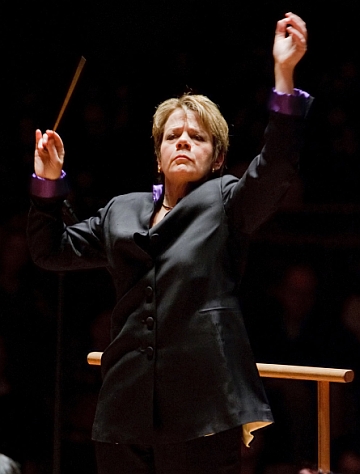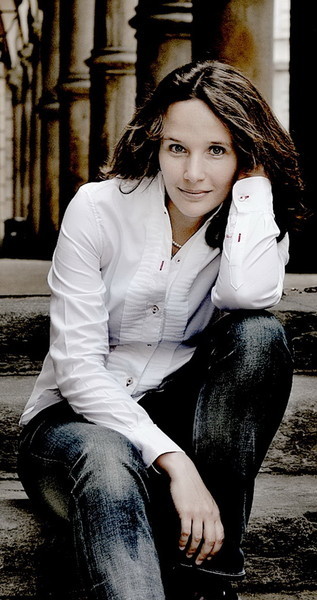A moving meditation and supreme Brahms from Alsop, BSO

Marin Alsop conducted the Baltimore Symphony Orchestra Friday night at Meyerhoff Symphony Hall.
With a quiet work for strings being recorded at the Baltimore Symphony Orchestra’s concert Friday night, Marin Alsop made a special request to the Meyerhoff Symphony Hall audience to refrain from “hacking up a lung.”
That opening work was Within Her Arms by Anna Clyne, the orchestra’s former composer in residence. Written in 2009 in response to the death of her mother, Within Her Arms is a fifteen-minute meditation on loss. Written for fifteen string players with conductor, the music exists in a nebulous world between chamber and orchestral music.
The work grows organically out of a four-note motif introduced in a violin solo, and carries the listener through poignant and heartfelt emotional landscapes without ever becoming saccharine or self-pitying. Under Alsop’s guidance, the ensemble played with sensitivity and unity, creating a blended sound only heard in the most masterful chamber playing.
The composer was in the audience for this BSO premiere, and Clyne was greeted with warm applause at the work’s conclusion.
Though published before his Fourth Symphony, Schumann’s Symphony No. 3 was his last work written in the genre. The “Rhenish” subtitle originates from the tale that Schumann conceived this symphony while on a trip with Clara to the Rhineland, a particularly happy time in the composer’s often tumultuous life.
The BSO’s horn section was on fine display in this piece, playing with tremendous power and precision. Alsop consistently drew a varied palette of sounds from the orchestra, taking full advantage of Schumann’s rich and varied orchestral writing. The musicians played with vigor and enthusiasm in the work’s triumphant finale, drawing enthusiastic applause.

Helene Grimaud
After intermission, Hélène Grimaud joined the orchestra to perform Brahms’ Piano Concerto No. 2. The Second is an unusually long concerto, typically taking over forty minutes to perform. It also poses a unique set of challenges to performers, requiring tremendous endurance as well as sensitivity to the larger symphonic musical texture.
The work opens with a solo horn gently introducing the main theme in a duet with the pianist, which Grimaud and principal horn Philip Munds played to enchanting effect. A tumultuous cadenza follows the introduction of this theme, which Grimaud executed with intensity and grandeur, proving herself fully suited to the daunting physical demands of this music.
Throughout the work, Grimaud produced a volume of sound to rival the orchestra, no mean feat in the Meyerhoff, which is often a challenging hall for soloists. Yet she also proved capable of playing with a rich variety of coloring, and created special moments of quiet beauty in the lyrical third movement.
Besides being one of the most difficult works ever written for the piano, this concerto also makes great demands on the orchestra. Alsop guided the ensemble with great finesse, allowing them to play with great expression while still keeping them aligned with Grimaud.
At the end of the concerto, the audience gave one of the most enthusiastic ovations of the BSO’s season thus far. Grimaud graciously acknowledged the cheers and applause as she took the stage for numerous curtain calls.
The program will be repeated 8 p.m. Saturday at Meyerhoff Hall. bsomusic.org; 410-783-8000.

Posted Mar 05, 2017 at 5:47 pm by John A Howest
This review is far more accurate and much better written than that ridiculous review of Thursday’s concert at Strathmore in The Washington Post. My compliments to JT Hassell for getting it right. This was truly wonderful in all respects. How often do we get to see and hear one of the greatest living pianists like Helene Grimaud? Her Brahms is right up there with giants like Backhaus, Richter, Fischer and even Gould. Please bring her back soon!